The Ultimate Guide to Tea and Blood Pressure: Which tea is good for high blood pressure?
Table of Contents
Tea is a popular beverage known for its potential health benefits, but when it comes to blood pressure, not all teas are created equal. If you’re looking for tea for high blood pressure, certain varieties like green tea or herbal teas can help lower blood pressure naturally. However, some teas might even increase blood pressure, depending on their caffeine content. In this article, we’ll explore the best tea for high blood pressure, including teas that reduce blood pressure effectively. We’ll also answer common questions like “does tea increase blood pressure?” to help you make informed choices for better heart health.
Tea and High Blood Pressure: How Tea Can Help Lower Blood Pressure
Certain types of tea have been shown to help lower blood pressure naturally. Teas like hibiscus, green tea, and ginger tea contain antioxidants and compounds that relax blood vessels, improve circulation, and reduce inflammation, all contributing to better heart health. Regular consumption of these teas can be a helpful addition to managing high blood pressure.
Can Tea Lower Blood Pressure?
Yes, certain types of tea can help lower blood pressure. Green tea is particularly effective due to its high levels of antioxidants, especially catechins, which have been shown to help relax blood vessels, improve circulation, and reduce high blood pressure. Hibiscus tea is another popular choice, with research indicating that it can lower both systolic and diastolic blood pressure, making it one of the most effective teas for blood pressure management.
On the other hand, some teas may not have the same positive effects. Licorice tea, for instance, can increase blood pressure when consumed in large amounts due to its glycyrrhizin content, which can lead to fluid retention and higher blood pressure. While many teas offer health benefits, their effects can vary based on their ingredients and how they interact with the body.
How Does Tea Help Lower Blood Pressure?
Tea, especially certain types like green tea, hibiscus tea, and chamomile tea, can be an effective and natural way to lower blood pressure. The benefits of tea on high blood pressure are primarily attributed to the unique compounds it contains, such as catechins, flavonoids, and polyphenols. Here’s how tea helps reduce blood pressure from different angles:
1. Key Compounds in Tea for Blood Pressure
- Catechinsand flavonoids found in teas like green tea can help lower blood pressure by improving blood vessel function, reducing vascular resistance, and enhancing the elasticity of blood vessels. This relaxation of the blood vessels can lead to improved circulation and lower pressure.
- Polyphenolsin black tea and herbal teas also contribute to improved endothelial function, helping to regulate blood flow and reduce blood pressure over time.
2. Impact of Tea on Cardiovascular Health
- Regular consumption of blood pressure-lowering teahelps to improve heart health by reducing oxidative stress and inflammation. By reducing these factors, tea can indirectly lower blood pressure, contributing to long-term cardiovascular benefits.
- Studies have shown that certain teas, such as hibiscus teaand green tea, may also help regulate cholesterol levels, a common factor that affects blood pressure and heart health.
3. Antioxidant Properties of Tea
- The antioxidants in tea help neutralize harmful free radicals, reducing damage to the blood vessel walls. This process allows blood vessels to remain more flexible and relaxed, which can help lower blood pressure. Green tea, in particular, is known for its high levels of antioxidants, which are crucial for protecting heart and blood vessel health.
4. Tea’s Stress-Reducing Effect
- Many herbal teas, such as chamomile tea, peppermint tea, and lavender tea, have natural sedative effects that can help reduce stress and anxiety. As stressis a major contributor to high blood pressure, consuming these teas can play a key role in managing blood pressure levels by promoting relaxation and improving sleep quality.
Tea’s Diuretic Effect
Certain teas, like dandelion and hibiscus, have a mild diuretic effect that helps reduce fluid retention in the body. By promoting increased urine production, these teas help lower blood pressure by reducing the amount of fluid in the blood vessels, ultimately decreasing vascular pressure.
Tea’s Role in Regulating Sodium
Teas such as chamomile and ginger can help regulate sodium levels in the body. By promoting fluid excretion and supporting kidney function, these teas prevent excess sodium buildup, helping reduce blood pressure and improve overall cardiovascular health.
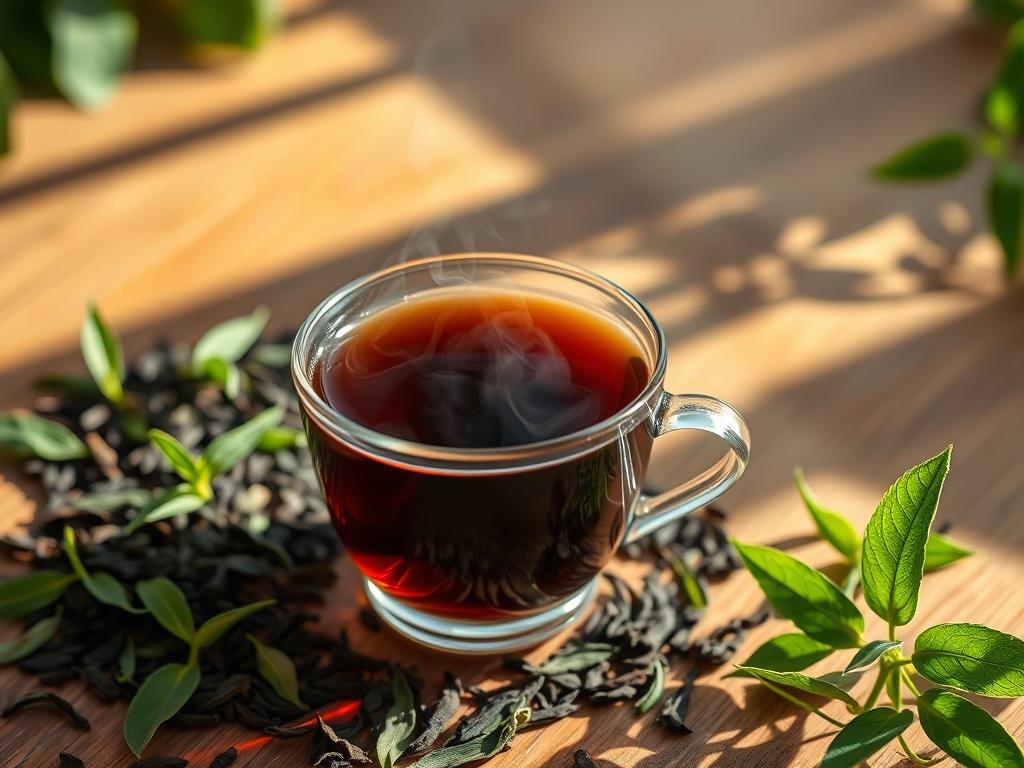
How Fast Does Tea Lower Blood Pressure?
The impact of tea on blood pressure varies depending on the type of tea, its key ingredients, and frequency of consumption. While results aren’t immediate, regular intake of specific teas can lead to long-term reductions in high blood pressure. Here’s how different teas help and the expected timeframe for seeing results:
1. Hibiscus Tea: Noticeable Results in Weeks
Hibiscus tea has been shown to reduce systolic and diastolic blood pressure effectively. Regular consumption of hibiscus tea (typically 1-2 cups daily) may lead to noticeable reductions in blood pressure within 3 to 6 weeks. Studies suggest it can lower systolic blood pressure by 7-10 mmHg.
2. Green Tea: Gradual Improvement Over Time
Green tea, rich in catechins and flavonoids, has a more gradual effect on blood pressure. While its benefits are evident over time, consistent consumption (2-3 cups daily) can help improve vascular health and lower blood pressure over the course of several months. Effects on systolic blood pressure are usually more subtle but beneficial.
3. Chamomile Tea: Immediate Relaxation, Long-Term Benefits
Chamomile tea, often consumed for its calming effects, can lower blood pressure immediately after consumption by reducing stress and promoting relaxation. The long-term effects are less pronounced but can contribute to stress reduction, which in turn helps manage blood pressure over time.
4. Black Tea: Modest Long-Term Effects
Black tea contains compounds that can help improve blood vessel function and may result in modest reductions in blood pressure with consistent consumption. However, its impact is typically less immediate compared to hibiscus or green tea, and results may take several weeks of regular drinking.
While the effects of tea for high blood pressure may not be immediate, consistent consumption of specific teas such as hibiscus, green tea, and chamomile can lead to gradual improvements. Most noticeable changes in blood pressure typically occur within 3 to 6 weeks of regular tea consumption, with longer-term benefits becoming evident after several months. Incorporating tea into a balanced lifestyle with proper diet, exercise, and stress management can enhance these effects over time.
What Tea Is Good for High Blood Pressure?
If you’re looking for tea for high blood pressure, several types of tea have been shown to help manage and even reduce high blood pressure over time. Below are some of the most effective teas for lowering blood pressure:
1. Green Tea
- Why It’s Good: Green teais rich in catechins and flavonoids, which have antioxidant properties that can help improve blood vessel function. Regular consumption of green tea has been shown to help reduce systolic and diastolic blood pressure by improving blood flow and vessel elasticity.
- Timeframe for Effects: While the effects are gradual, drinking green tea consistently over several weeks can contribute to long-termblood pressure reduction.
2. Black Tea
- Why It’s Good: Like green tea, black teaalso contains flavonoids that can support healthy blood vessels and improve circulation. Though black tea has more caffeine than green tea, it still offers moderate benefits for lowering blood pressure, particularly with regular consumption.
- Timeframe for Effects: You may see modest improvements after several weeks of daily black tea consumption.
3. Hibiscus Tea
- Why It’s Good: Hibiscus teais one of the most effective herbal teas for lowering blood pressure. Studies have shown that drinking hibiscus tea can help reduce both systolic and diastolic blood pressure due to its high content of anthocyanins and other antioxidants, which relax blood vessels.
- Timeframe for Effects: You may start seeing results within 1-3 weeks of drinking hibiscus tea daily.
4. Ginger Tea
- Why It’s Good: Ginger teahas natural anti-inflammatory properties and helps with blood circulation, which can indirectly lower high blood pressure. Ginger can also help in reducing stress, another common trigger for high blood pressure.
- Timeframe for Effects: Ginger may help lower blood pressure more quickly compared to other teas, with noticeable effects within a few hours to a day.
5. Chamomile Tea
- Why It’s Good: While not a direct blood pressure-loweringtea, chamomile tea is known for its calming effects, which can help reduce stress and anxiety. Since stress is a significant contributor to high blood pressure, chamomile can indirectly support healthy blood pressure levels.
- Timeframe for Effects: You may experience short-term relief from stress and mild blood pressure reduction after a cup of chamomile tea, with long-term benefits from regular consumption.
6. Other Herbal Teas
- Why They’re Good: Other herbal teas like lavender tea and lemon balm tea also promote relaxation and stress relief, which can contribute to lower blood pressure over time. These teas are particularly useful when consumed in the evening to reduce stress and promote restful sleep.
- Timeframe for Effects: The benefits may be more gradual but can help maintain healthy blood pressure levels when consumed regularly. These teas are especially useful for managing nighttime stress.
Consuming the right teas regularly can be an effective part of a healthy lifestyle for managing high blood pressure. Whether it’s green tea for its long-term benefits or ginger tea for a quick reduction in blood pressure, the key is consistency. Combining tea with a balanced diet, regular exercise, and stress management can help maintain healthy blood pressure levels.
| Tea Type | Benefits | Key Ingredients | Timeframe |
|---|---|---|---|
| Green Tea | Improves blood vessel function, reduces blood pressure | Catechins, Flavonoids | Gradual, visible in weeks |
| Black Tea | Supports circulation and vessel health | Flavonoids, Caffeine | Modest effects in several weeks |
| Hibiscus Tea | Reduces systolic and diastolic blood pressure | Anthocyanins, Antioxidants | 1-3 weeks |
| Ginger Tea | Improves circulation, reduces inflammation | Ginger | Quick, within hours to a day |
| Chamomile Tea | Reduces stress, indirectly lowers blood pressure | Apigenin | Short-term, long-term with regular use |
| Lavender Tea | Promotes relaxation and stress relief | Linalool, Antioxidants | Gradual, with regular use |
| Lemon Balm Tea | Relieves stress, helps lower blood pressure | Rosmarinic acid, Flavonoids | Long-term with regular use |
Which Tea Lowers Blood Pressure Fast?
If you’re looking for tea that can help lower blood pressure fast, ginger tea and hibiscus tea are two of the most effective options. Ginger tea has natural anti-inflammatory and circulation-boosting properties, which can lead to a noticeable drop in blood pressure within a few hours of consumption. Hibiscus tea, rich in anthocyanins and antioxidants, has been shown in studies to lower systolic and diastolic blood pressure relatively quickly, often within a few days to a week of daily drinking. While these teas can offer quick relief, their full effects are enhanced when consumed consistently as part of a healthy lifestyle.
Best Tea to Drink for High Blood Pressure.
When it comes to lowering high blood pressure, hibiscus tea and green tea are among the best options. Hibiscus tea is known for its ability to reduce both systolic and diastolic blood pressure, with studies showing significant benefits after just a few weeks of regular consumption. Green tea, rich in catechins and flavonoids, helps improve blood vessel health and circulation, making it a great choice for long-term blood pressure management.
Both of these teas not only help lower blood pressure but also provide numerous other health benefits, such as improving heart health and boosting overall wellness.
Tea for low blood pressure: Can Tea Raise Blood Pressure?
The question of whether drinking tea increases blood pressure is nuanced, as the effect can vary depending on the type of tea and the individual’s health. Generally, most teas, especially non-herbal teas, contain some level of caffeine, which is known to temporarily raise blood pressure due to its stimulant properties. This effect, however, is usually short-lived and not significant for most people unless consumed in large quantities.
- Caffeine Content:Teas like black and green tea, which contain caffeine, can potentially raise blood pressure temporarily. For individuals sensitive to caffeine, even small amounts might lead to a noticeable increase in blood pressure.
- Type of Tea:While black and green teas can cause a temporary spike in blood pressure due to their caffeine content, herbal teas such as hibiscus or chamomile typically do not contain caffeine and are often recommended to help manage or lower blood pressure. In fact, studies suggest that hibiscus tea can significantly lower blood pressure over time.
- Individual Responses:It’s important to note that individual responses to caffeine can vary greatly. Some people may experience more pronounced effects from caffeine than others, which can be influenced by genetics, existing health conditions, and tolerance to caffeine.
- Best Tea for Low Blood Pressure:For those with low blood pressure looking to avoid any decrease in their blood pressure levels, caffeinated teas might be beneficial. However, it’s crucial to moderate intake to prevent adverse effects or significant blood pressure spikes.
In conclusion, while drinking tea can lead to a temporary increase in blood pressure due to caffeine, the effect is usually mild and short-lived. Those concerned about blood pressure should monitor their response to different types of tea and consult with a healthcare provider to tailor their tea consumption according to their health needs.
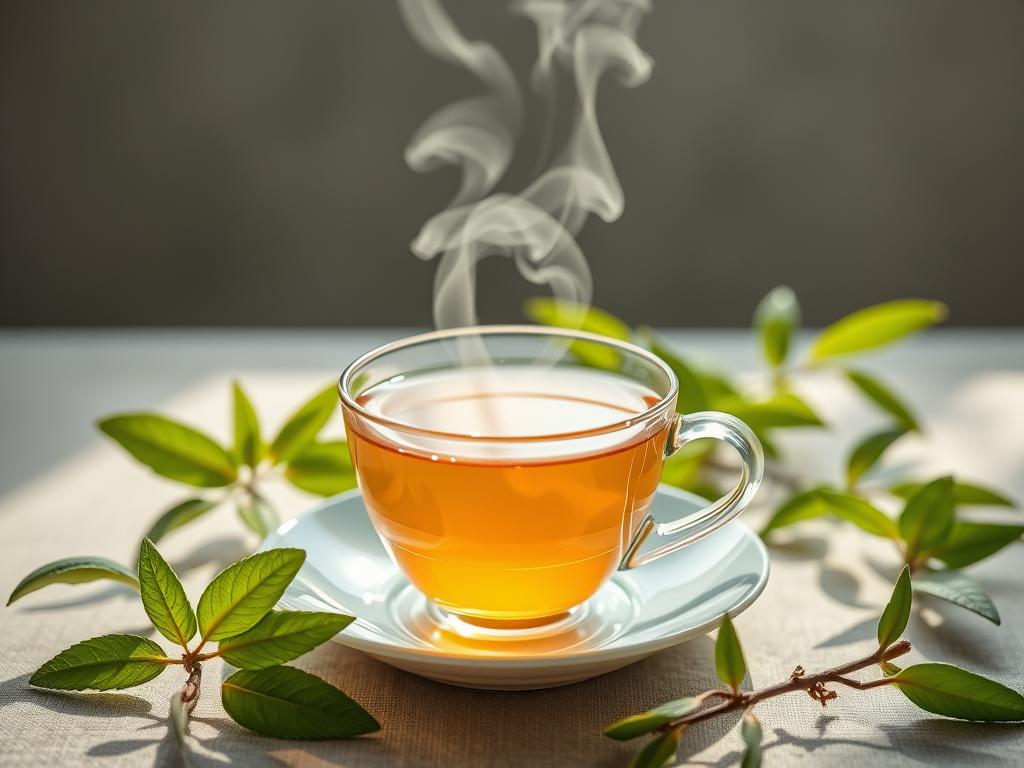
How Does Tea That Raises Blood Pressure Work?
Tea, especially those that contain caffeine like black and green tea varieties, can raise blood pressure through several mechanisms. Understanding these can help manage consumption, particularly for those concerned about hypertension or related health issues.
1. Caffeine’s Role in Blood Pressure
- Mechanism: Caffeine in tea, found in varieties like black, green, and white tea, stimulates the nervous system. This stimulation leads to the release of adrenaline, a hormone that increases heart rate and constricts blood vessels, causing a temporary spike in blood pressure.
- Duration: The increase in blood pressure from caffeine is typically short-term. Regular consumers of caffeinated tea may develop a tolerance, which can lessen this effect over time.
2. Interaction with Blood Vessel Function
- Impact on Endothelial Function: Caffeine can affect the endothelium—the inner lining of blood vessels. It may hinder the production of nitric oxide, a natural vasodilator that helps blood vessels relax and widen.
- Vasoconstriction: The reduced availability of nitric oxide due to caffeine leads to vasoconstriction, thus temporarily raising blood pressure.
3. Individual Sensitivity and Genetic Factors
- Genetic Predisposition: The impact of caffeine on blood pressure varies significantly among individuals. Genetic factors that influence how caffeine is metabolized can make some people more sensitive to its effects.
- Existing Health Conditions: Those with hypertension or cardiovascular disease may experience more pronounced increases in blood pressure following caffeine consumption from tea.
4. Sympathetic Nervous System Stimulation
- Stress Response: Caffeine activates the sympathetic nervous system, responsible for the ‘fight or flight’ response. Activation of this system can lead to an increase in blood pressure, preparing the body to handle perceived threats.
5. Volume and Frequency of Consumption
- Amount Consumed: The quantity of tea consumed can significantly affect the amount of caffeine ingested, influencing how much and how quickly blood pressure rises.
- Frequency of Intake: Drinking caffeinated tea regularly can lead to temporary increases in blood pressure. However, habitual drinkers may develop a tolerance, which can reduce the frequency and intensity of these spikes.
These points collectively explain the physiological mechanisms through which tea can increase blood pressure, primarily due to the effects of caffeine. Understanding these mechanisms helps individuals tailor their tea consumption to better manage blood pressure levels.
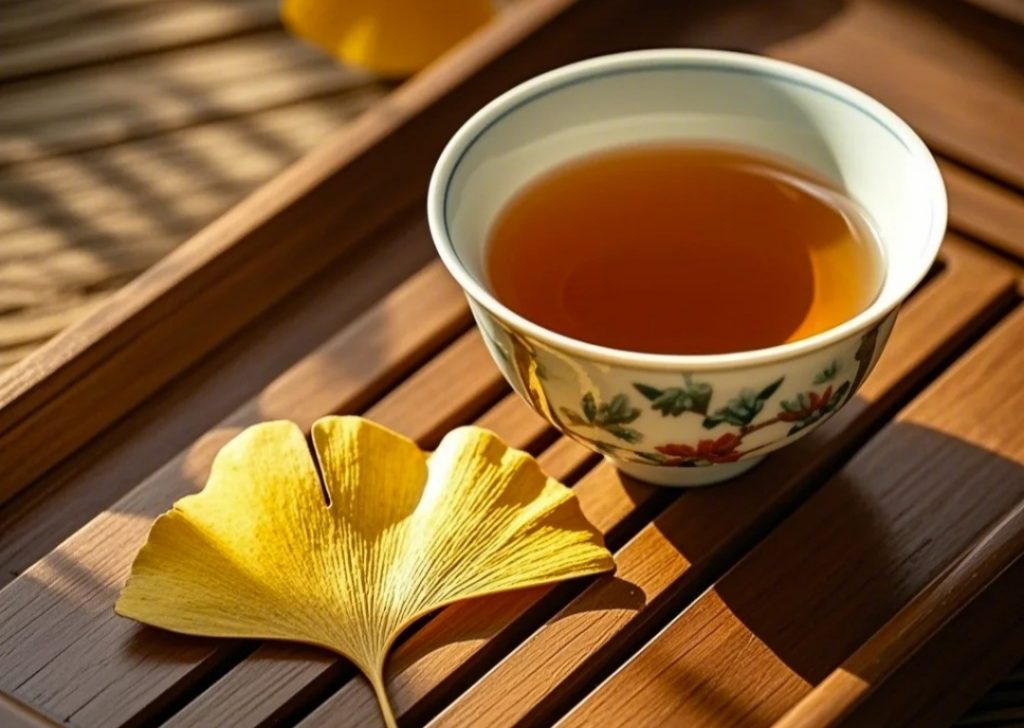
What Teas Can Increase Blood Pressure?
While most teas are considered beneficial for overall health, certain teas can potentially increase blood pressure, particularly due to their caffeine content or specific herbal properties.
Caffeinated Teas
Teas like black tea, green tea, white tea, and oolong tea contain caffeine, which can temporarily raise blood pressure by stimulating the nervous system. This effect is typically short-lived, and for regular tea drinkers, tolerance may develop, minimizing the impact over time. However, excessive consumption of these teas can still lead to sustained increases in blood pressure for individuals sensitive to caffeine or those with hypertension.
Herbal Teas That May Increase Blood Pressure
Some herbal teas, due to their active compounds, can have a stronger and more lasting effect on blood pressure:
- Ginseng Tea: Ginseng is an adaptogen that may increase blood pressurein some people by stimulating the nervous system and increasing heart rate. Its effects can vary based on the individual’s baseline health and the dosage consumed.
- Ginkgo Biloba Tea: While often used to improve circulation, ginkgo biloba can also raise blood pressurewhen consumed in large amounts, particularly in combination with certain medications or stimulants.
- Licorice Tea: Licorice contains glycyrrhizin, which can lead to sodium retentionand potassium loss, causing increased blood pressure and fluid retention when consumed excessively.
- St. John’s Wort Tea: This herb interacts with various medications and may increase blood pressure in some individuals by interfering with the body’s natural regulatory systems.
- Yohimbe Tea: Yohimbe is a potent herbal stimulant that can cause significant increases in blood pressure due to its impact on the cardiovascular system. It is often used as a natural supplement but should be consumed with caution.
Long-Term Considerations
For most caffeinated teas, the blood pressure increase is typically temporary and not harmful in the long term for healthy individuals. However, the herbal teas listed above can lead to more persistent effects on blood pressure, especially if consumed frequently or in large amounts. People with pre-existing hypertension or cardiovascular conditions should exercise caution and consult with a healthcare provider before incorporating these teas into their diet.
If you are managing blood pressure, it’s essential to choose teas wisely and limit those that may exacerbate hypertension. Opting for non-caffeinated, calming teas like chamomile or hibiscus may be a safer choice for long-term health.
Are All Tea Good for Blood Pressure? A Detailed Examination.
Tea has long been celebrated for its health benefits, including its potential effects on blood pressure. Certain teas, such as hibiscus tea and green tea, are known to help lower blood pressure by promoting better vascular health and reducing tension in blood vessels. On the other hand, some teas with caffeine or specific herbal ingredients, like licorice or yohimbe, may temporarily or persistently raise blood pressure, particularly in sensitive individuals.In this guide, we’ll explore the best teas for high blood pressure, teas that help lower blood pressure, and those that might have the opposite effect.
Is Green Tea Good for High Blood Pressure?
Yes, green tea is considered good for managing high blood pressure. It contains catechins, powerful antioxidants that help relax blood vessels, improve blood flow, and reduce vascular resistance. Studies have shown that regular consumption of green tea can help lower blood pressure by supporting cardiovascular health and reducing oxidative stress.
While green tea is beneficial for most people, it contains caffeine, which may cause a temporary increase in blood pressure in sensitive individuals. However, this effect is usually mild and short-lived. Drinking 2-3 cups daily of green tea as part of a balanced diet can contribute to lowering high blood pressure over time.
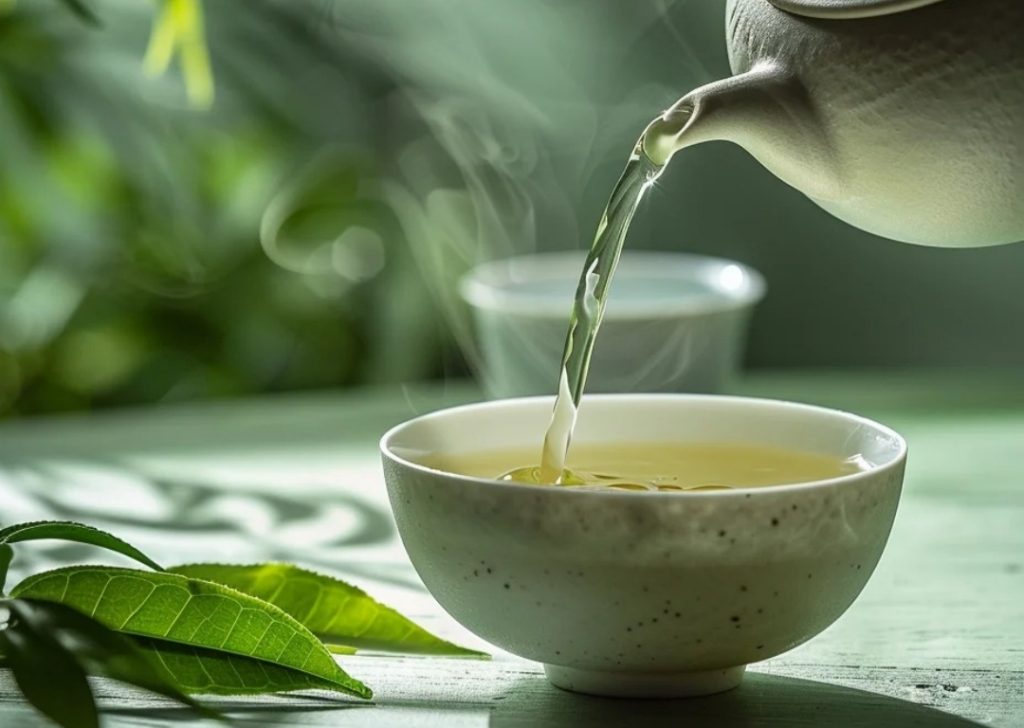
How Does Drinking Green Tea Lower Blood Pressure?
- Catechins in Green Tea: The high concentration of catechins, a type of antioxidant, helps reduce oxidative stress. This protects the blood vessels from damage and promotes their ability to relax and widen, which lowers blood pressure.
- Reduction of Inflammation: Antioxidants also combat inflammation, a common contributor to hypertension.
- Endothelial Health: Green tea enhances the function of the endothelium (the lining of blood vessels), supporting better vasodilation. This allows blood to flow more easily, reducing vascular resistance and lowering blood pressure.
- Nitric Oxide Production: Catechins stimulate the production of nitric oxide, a compound that relaxes blood vessels. This reduces the strain on the cardiovascular system, helping to manage high blood pressure effectively.
- Impact on Arteries: Green tea helps improve the flexibility and elasticity of arteries, which can reduce the force the heart needs to pump blood, leading to a drop in blood pressure.
- Indirect Effects: Green tea supports weight management by boosting metabolism, and a healthy weight is strongly linked to better blood pressure control. Improved metabolic health can also reduce insulin resistance, which is another factor influencing blood pressure.
- Reduction of Stress Hormones: Green tea may lower levels of stress hormones like cortisol, which can indirectly reduce blood pressure by promoting relaxation and reducing the effects of stress on the cardiovascular system.
- Impact on Sodium Regulation: Green tea has diuretic properties that can help flush out excess sodium from the body, which is a key contributor to high blood pressure.
Which Green Tea Is Best for High Blood Pressure?
For managing high blood pressure, high-quality green teas with abundant antioxidants like catechins are the most effective. Chinese and Japanese green teas stand out for their unique health benefits. Here are some of the best options:
Chinese Green Teas
- West Lake Longjing (Dragon Well): Known for its smooth flavor and high catechin content, Longjing teasupports cardiovascular health by improving blood vessel elasticity and reducing oxidative stress, which helps lower blood pressure.
- Biluochun (Green Snail Spring): This delicate tea is rich in antioxidants and has a calming effect, making it an excellent choice for managing high blood pressureand promoting relaxation.
Japanese Green Teas
Matcha tea: Matcha tea help lower blood pressure due to its high levels of catechins, particularly epigallocatechin gallate (EGCG), which improve blood vessel function and promote relaxation. Regular consumption of matcha can contribute to better cardiovascular health, reduce inflammation, and gradually lower systolic and diastolic blood pressure over time, though effects may vary by individual.
Why These Teas Work
Both Chinese and Japanese green teas are loaded with antioxidants that relax blood vessels, improve circulation, and reduce the risk of hypertension-related complications. Choosing organic, high-quality loose-leaf options enhances these benefits.
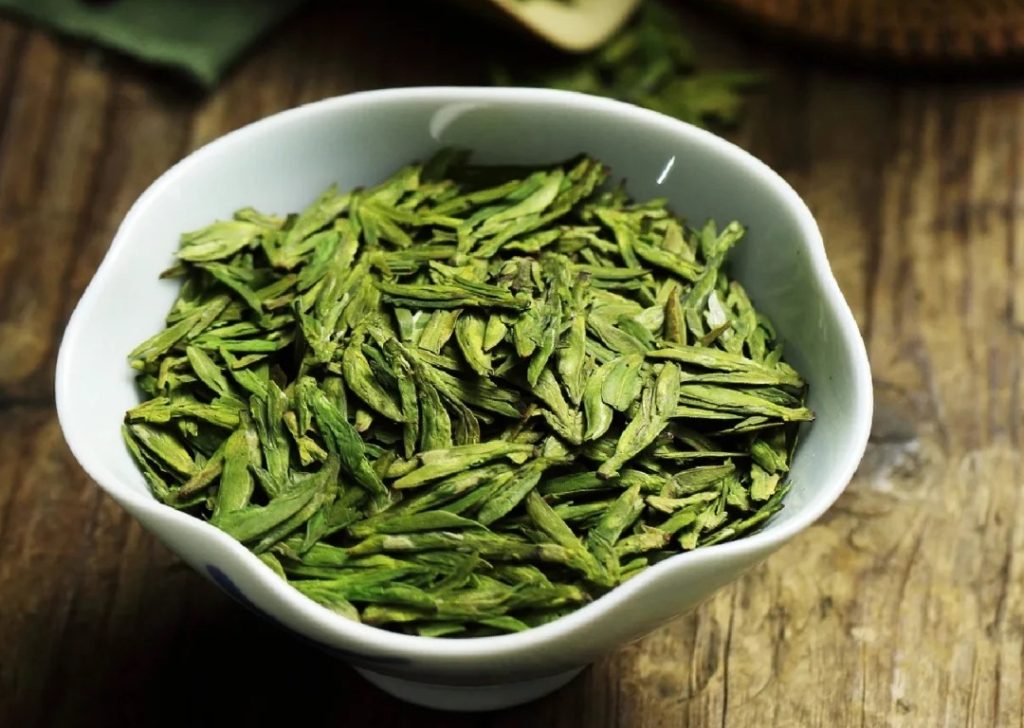
Does drinking black tea increase blood pressure
Black tea contains caffeine, which can temporarily increase blood pressure by stimulating the nervous system and causing blood vessels to constrict. This short-term effect typically lasts for a few hours and is more pronounced in individuals sensitive to caffeine or those who consume large quantities of tea.
Is black tea good for high blood pressure
Black tea can have mixed effects on blood pressure, depending on how it’s consumed and individual health factors. Studies suggest that regular consumption of black tea, in moderate amounts, may help lower blood pressure over time due to its high flavonoid content. These antioxidants support cardiovascular health by improving blood vessel function and promoting better blood circulation.
However, black tea also contains caffeine, which can temporarily increase blood pressure in sensitive individuals or those who consume it in large quantities. For those with high blood pressure, it’s best to limit black tea intake to 1-2 cups per day to balance its health benefits while minimizing potential risks.
Black Tea vs. Green Tea: Which Is Better for Blood Pressure?
Black tea and green tea both offer health benefits, but their effects on blood pressure can vary due to differences in their composition and properties. Let’s explore how they compare in key areas to help you decide which is better for managing high blood pressure.
1. Key Compounds and Health Effects
- Green Tea: Rich in catechins, powerful antioxidants that reduce oxidative stress and inflammation, green tea helps improve blood vessel health and promotes lower blood pressure levels.
- Black Tea: Contains flavonoids, which also support cardiovascular health by improving blood vessel function. However, black tea has a higher caffeine content, which may cause a short-term increase in blood pressure.
2. Caffeine Content
- Green Tea: Has a lower caffeine content compared to black tea, making it less likely to cause blood pressure spikes. Over time, regular consumption of green tea can help stabilize blood pressure.
- Black Tea: Contains more caffeine, which can lead to a temporary rise in blood pressure, particularly in individuals sensitive to caffeine. However, those with higher caffeine tolerance may not experience significant effects.
3. Antioxidant and Cardiovascular Protection
- Green Tea: Offers a stronger antioxidant profile, helping to neutralize free radicals, reduce damage to blood vessels, and improve their elasticity, which directly lowers blood pressure.
- Black Tea: Though slightly less potent in antioxidants compared to green tea, black tea still supports heart health and aids in reducing blood pressure when consumed regularly.
4. Short-Term vs. Long-Term Effects
- Green Tea: Provides more stable, long-term benefits for blood pressure management, making it a preferred choice for individuals looking to maintain healthy blood pressure levels.
- Black Tea: May cause short-term increases in blood pressure due to its caffeine content but has shown long-term benefits for cardiovascular health when consumed in moderation (1-2 cups daily).
5. Best Suited for Specific Individuals
- Green Tea: Ideal for most people managing high blood pressureor those who are sensitive to caffeine. Its calming effects and lower caffeine levels make it a safer daily choice.
Black Tea: Suitable for individuals accustomed to caffeine and those who can tolerate short-term blood pressure fluctuations. It should be consumed in moderation to balance its benefits and potential risks.
Conclusion: Which Is Better?
For individuals with high blood pressure, green tea is generally the better option due to its higher antioxidant content, lower caffeine levels, and long-term stabilizing effects on blood pressure. Black tea, while beneficial for heart health, should be consumed in moderation due to its caffeine content and potential to cause short-term spikes in blood pressure.
| Aspect | Green Tea | Black Tea |
| Key Compounds | Rich in catechins, reduces inflammation, improves blood vessels. | Contains flavonoids, supports heart health. |
| Caffeine Content | Lower caffeine, less likely to spike blood pressure. | Higher caffeine, may temporarily raise blood pressure. |
| Antioxidant Protection | Strong antioxidants, improves blood vessel elasticity. | Moderate antioxidants, supports cardiovascular health. |
| Effects | Long-term blood pressure benefits. | Short-term rise in blood pressure, long-term heart benefits. |
| Best For | Ideal for those with high blood pressure or caffeine sensitivity. | Suitable for caffeine-tolerant individuals, in moderation. |
Herbal Tea and Blood Pressure: How to make the right choice
When it comes to managing high blood pressure, herbal teas can offer a natural and soothing solution. Many herbal teas are known for their ability to help lower blood pressure by promoting relaxation, improving circulation, and reducing inflammation. We’ll explore the best herbal teas for high blood pressure and how to select the most effective ones for your needs.
How Herbal Tea for Lower High Blood Pressure Works?
Herbal teas can be an effective and natural way to help lower high blood pressure due to their unique properties that promote relaxation, improve circulation, and reduce inflammation. Here’s how they work:
1. Relaxation of Blood Vessels
Many herbal teas contain compounds that help relax blood vessels, making it easier for blood to flow. For example, hibiscus tea has been shown to relax blood vessel walls, reducing blood pressure. Other calming herbs like chamomile and lavender also help reduce stress, which can lower blood pressure.
2. Reducing Inflammation
Chronic inflammation contributes to high blood pressure. Herbal teas like ginger tea and turmeric tea have anti-inflammatory properties that can help reduce inflammation in blood vessels, improving circulation and lowering blood pressure over time.
3. Diuretic Effect
Some herbal teas, such as dandelion tea, act as natural diuretics, helping to remove excess sodium and fluid from the body. By reducing fluid retention, these teas help lower blood pressure and prevent fluid buildup in the bloodstream.
4. Stress Reduction
Stress is a major factor in increasing blood pressure. Herbal teas like valerian root tea and lemon balm tea have calming effects that reduce stress levels, helping to prevent spikes in blood pressure caused by anxiety or nervousness.
5. Improving Circulation
Some herbs, such as ginger and garlic, are known to improve circulation and enhance heart health. They can help blood flow more easily through the vessels, reducing the workload on the heart and lowering blood pressure.
Incorporating the right herbal teas into your daily routine, alongside a healthy diet and lifestyle, can play a significant role in managing high blood pressure naturally.
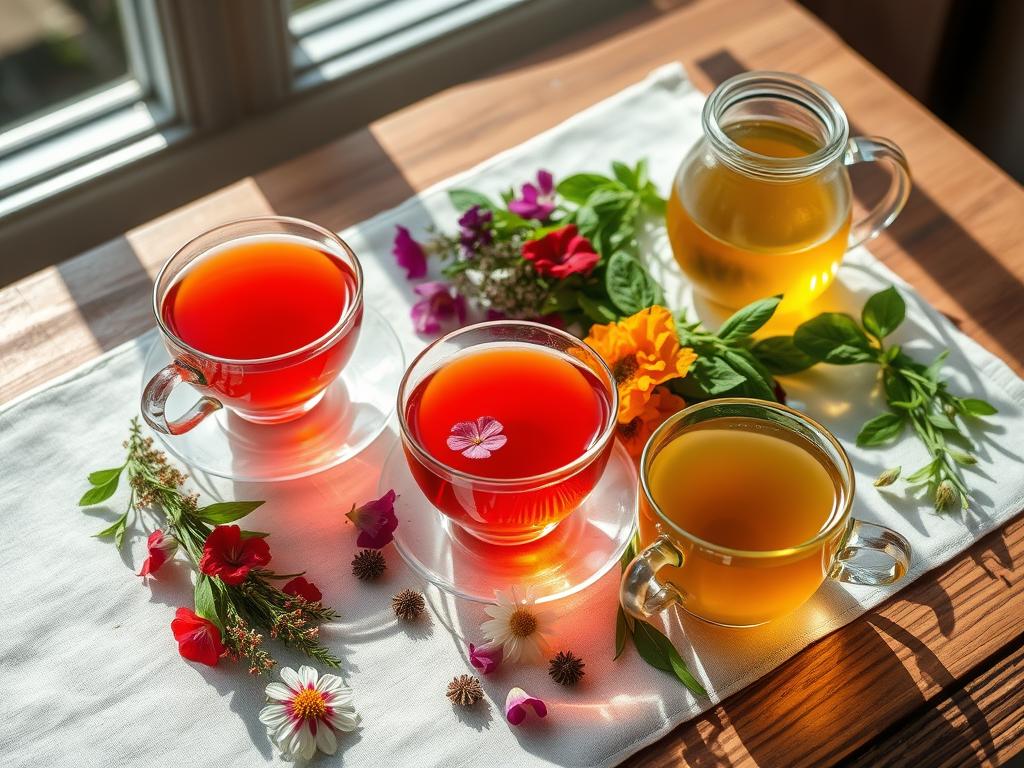
Best Herbal Teas for High Blood Pressure
Herbal teas have long been valued for their potential health benefits, including their ability to help manage high blood pressure. Some herbal teas are particularly effective due to their unique compounds that support cardiovascular health. Among the many options, here are some of the best herbal teas for high blood pressure:
1. Can ginger tea lower blood pressure?
- How It Helps: Ginger teais known for its anti-inflammatory and circulation-boosting properties. Ginger can help improve blood flow and relax blood vessels, which lowers the pressure in the arteries. Regular consumption of ginger tea can help manage high blood pressure by reducing the strain on the heart.
- Why It Works: The bioactive compoundsin ginger, such as gingerol, are believed to help lower blood pressure by reducing inflammation and promoting better circulation.
2. Does dandelion tea lower blood pressure?
- How It Helps: Dandelion teaacts as a natural diuretic, helping to flush excess sodium and fluids from the body. By reducing the volume of fluid in the blood vessels, dandelion tea can help lower blood pressure.
- Why It Works: Dandelion’s diuretic properties help reduce fluid retention and support kidney function, which is key in regulating blood pressure. It is also rich in potassium, which counteracts the effects of sodium and promotes healthy blood pressure levels.
3. Is peppermint tea good for high blood pressure?
- How It Helps: Peppermint teahas a calming and relaxing effect on the body, making it an excellent choice for managing stress-induced high blood pressure. The menthol in peppermint can help relax the muscles around the blood vessels, allowing for easier blood flow and reduced pressure.
- Why It Works: Peppermint’s soothing properties help reduce stress and tension, which are common contributors to high blood pressure. Regularly drinking peppermint tea can promote overall relaxation and heart health.
4. Can cinnamon tea lower blood pressure?
- How It Helps: Cinnamon teacontains antioxidants that help improve circulation and lower cholesterol levels, both of which are important for managing blood pressure. Cinnamon has been shown to help reduce blood pressure by improving the function of blood vessels and supporting heart health.
- Why It Works: Cinnamon helps lower blood sugar and cholesterol, which in turn can help manage blood pressure. It also improves blood flow, which helps in reducing overall pressure on the cardiovascular system.
5. Linden tea and blood pressure?
- How It Helps: Linden teais a gentle, calming herb known for its ability to reduce stress and anxiety, which can, in turn, help lower blood pressure. Its mild sedative effects make it ideal for individuals who experience high blood pressure due to stress.
- Why It Works: Linden tea helps relax the nervous system and reduces stress-induced increases in blood pressure. The calming properties can help prevent spikes in blood pressure caused by anxiety.
6. Rooibos tea and blood pressure?
- How It Helps: Rooibos teais caffeine-free and rich in antioxidants, making it a great choice for those looking to manage high blood pressure Rooibos has been shown to improve circulation and reduce oxidative stress, both of which contribute to healthier blood pressure levels.
- Why It Works: Rooibos is high in antioxidants like flavonoids, which support heart health and improve the elasticity of blood vessels, leading to improved circulation and lower blood pressure.
7. Does soursop tea lower blood pressure?
- How It Helps: Soursop teais made from the leaves of the soursop tree, known for its potential to lower blood pressure. It has anti-inflammatory and antioxidant properties that help improve circulation and relax the blood vessels, promoting healthier blood pressure levels.
- Why It Works: Soursop is believed to have vasodilatory effects, meaning it helps widen blood vessels, thereby reducing blood pressure. It also supports overall heart health by reducing inflammation and oxidative stress.
8. Can chamomile tea lower blood pressure?
- How It Helps: Chamomile teais well-known for its calming and relaxing effects, making it ideal for reducing stress-induced high blood pressure. It helps relax the body and mind, which can lead to a natural reduction in blood pressure levels.
- Why It Works: Chamomile containsapigenin, an antioxidant that binds to certain receptors in the brain, promoting relaxation and reducing anxiety. By alleviating stress, chamomile helps prevent the blood pressure spikes that can occur due to emotional or physical stress.
9. Hibiscus tea for blood pressure.
- How It Helps: Hibiscus teais one of the most well-researched herbal teas for lowering blood pressure. It has been shown to be particularly effective in reducing systolic and diastolic blood pressure. Hibiscus works by promoting the relaxation of blood vessels and improving circulation.
- Why It Works: Hibiscus contains anthocyanins, powerful antioxidants that help improve blood vessel elasticity and reduce inflammation, both of which contribute to lower blood pressure. Studies have shown that drinking hibiscus tea regularly can lead to significant reductions in blood pressure.
From all herbal teas of lowering high blood pressure, several herbal teas stand out. Hibiscus tea is particularly effective, with studies showing it significantly reduces both systolic and diastolic pressure. Ginger tea and dandelion tea help improve circulation and reduce fluid retention, while peppermint tea promotes relaxation and reduces stress. Cinnamon tea supports heart health by improving blood vessel function, and rooibos tea offers antioxidant-rich benefits without caffeine. Chamomile tea and linden tea are great for stress relief, which can prevent blood pressure spikes. For optimal results, combining these teas with a healthy lifestyle can help manage blood pressure effectively.
Conclusion
Choosing the right tea can contribute to managing blood pressure. Green tea and hibiscus tea are excellent for lowering blood pressure due to their high antioxidant content. Herbal teas like chamomile and peppermint can help reduce stress, a contributing factor to high blood pressure. 1 However, teas containing caffeine, such as black tea, may temporarily increase blood pressure.
Frequently Asked Questions About Tea and Blood Pressure
Yes, green tea can help lower blood pressure. It is rich in antioxidants called catechins, particularly epigallocatechin gallate (EGCG), which improve blood vessel function and increase their elasticity. This leads to better blood flow and reduced pressure in the arteries. Regular consumption of green tea has been shown to lower both systolic and diastolic blood pressure over time. However, while green tea offers cardiovascular benefits, it should be consumed as part of an overall healthy lifestyle that includes a balanced diet and regular exercise. For best results in managing high blood pressure, green tea should be consumed consistently and in moderation. staining potential is relatively mild. To minimize staining, you can brush your teeth regularly, drink water after your tea, and consider using a straw.
Yes, Black tea contains caffeine, which can temporarily raise blood pressure due to its stimulatory effect on the cardiovascular system. However, regular consumers of black tea may develop a tolerance to caffeine, minimizing these effects over time. For individuals with high blood pressure, moderate consumption of black tea is typically safe, and it can even offer cardiovascular benefits through its high flavonoid content. These flavonoids improve blood vessel function and circulation. Nonetheless, individuals sensitive to caffeine should monitor their black tea intake to avoid potential spikes in blood pressure.
Yes, hibiscus tea can effectively lower blood pressure. Rich in antioxidants such as anthocyanins and flavonoids, hibiscus tea has been shown to help reduce both systolic and diastolic blood pressure. Its bioactive compounds work by relaxing blood vessels and increasing arterial flexibility, leading to improved blood flow and lower blood pressure levels. For optimal results, consuming two to three cups of hibiscus tea daily is recommended as part of a healthy diet. However, if you are taking blood pressure medication, it’s important to consult with a healthcare provider as hibiscus can interact with certain medications.
Yes, Chamomile tea is widely recognized for its calming effects, which can indirectly help lower blood pressure, particularly in those who experience stress-induced hypertension. While chamomile tea does not directly lower blood pressure like some other teas, its ability to promote relaxation and reduce stress can contribute to better overall cardiovascular health. Regular consumption of chamomile tea may aid in maintaining a healthy blood pressure level as part of a stress management routine. However, it is important to note that while chamomile tea is beneficial for relaxation, it should be used in conjunction with other lifestyle measures for managing high blood pressure.
Several teas are beneficial for managing high blood pressure, thanks to their natural properties. Green tea and hibiscus tea are among the best choices due to their high antioxidant content, which helps improve cardiovascular health by enhancing blood vessel function and lowering blood pressure. Green tea is rich in catechins that relax blood vessels and improve circulation, while hibiscus tea contains powerful anthocyanins and other antioxidants known to effectively reduce both systolic and diastolic blood pressure. Additionally, chamomile tea can also be helpful for reducing stress, a common contributor to high blood pressure. Regular consumption of these teas, as part of a balanced diet, can support better blood pressure management.
Tea can help lower blood pressure through several mechanisms. Many teas, especially green tea and hibiscus tea, are rich in antioxidants like catechins and anthocyanins. These compounds improve cardiovascular health by enhancing the elasticity of blood vessels, which helps in reducing arterial pressure. Additionally, the antioxidants in tea help combat oxidative stress, which is linked to high blood pressure. Some herbal teas, such as chamomile, promote relaxation and stress reduction, further aiding in blood pressure management. Regular consumption of these teas can lead to a gradual decrease in both systolic and diastolic blood pressure, contributing to overall heart health.
Dandelion tea is often touted for its potential health benefits, including its ability to lower blood pressure. This herbal tea acts as a natural diuretic, promoting urine production which helps reduce blood volume, thereby potentially lowering blood pressure. Dandelion tea is also rich in potassium, a mineral known for its heart health benefits, including blood pressure regulation. By increasing potassium intake, dandelion tea can help balance out the negative effects of sodium in the diet. While dandelion tea can be a beneficial addition to a heart-healthy lifestyle, it should be used in conjunction with other dietary and lifestyle changes for optimal blood pressure management.
Ginger tea is beneficial for individuals managing high blood pressure, primarily due to its potent anti-inflammatory and blood-thinning properties. These characteristics help improve blood circulation and relax the muscles surrounding blood vessels, leading to lower blood pressure. Additionally, ginger’s active component, gingerol, has been studied for its effects on heart health and its ability to reduce blood pressure by preventing blood clots and reducing cholesterol. Regular consumption of ginger tea can complement other lifestyle changes aimed at managing high blood pressure. However, it should be consumed in moderation, as excessive intake might lead to undesirable effects.

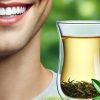

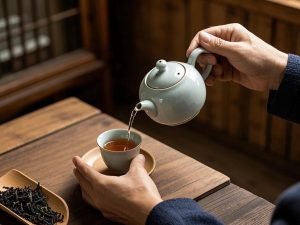
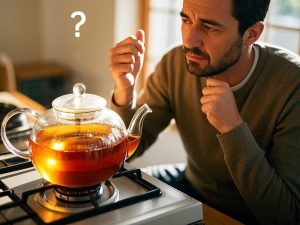
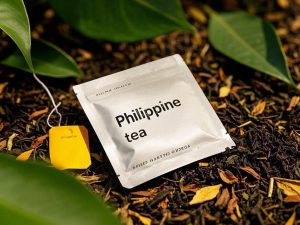

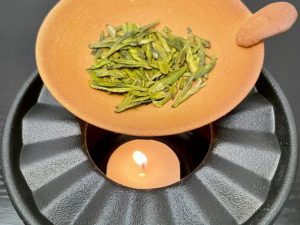





Leave a reply